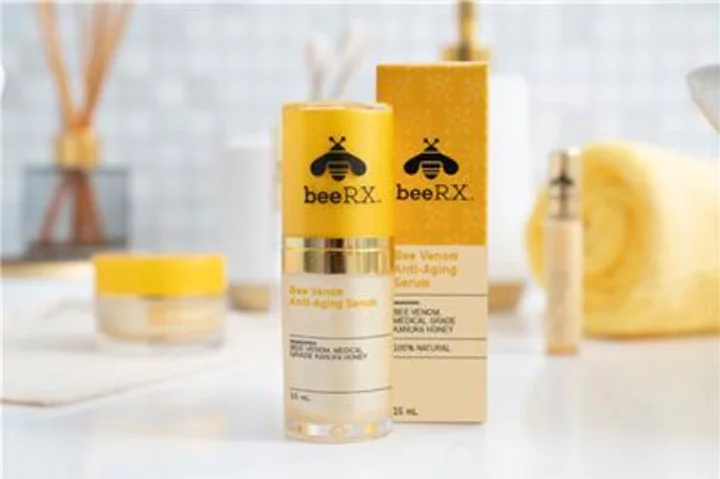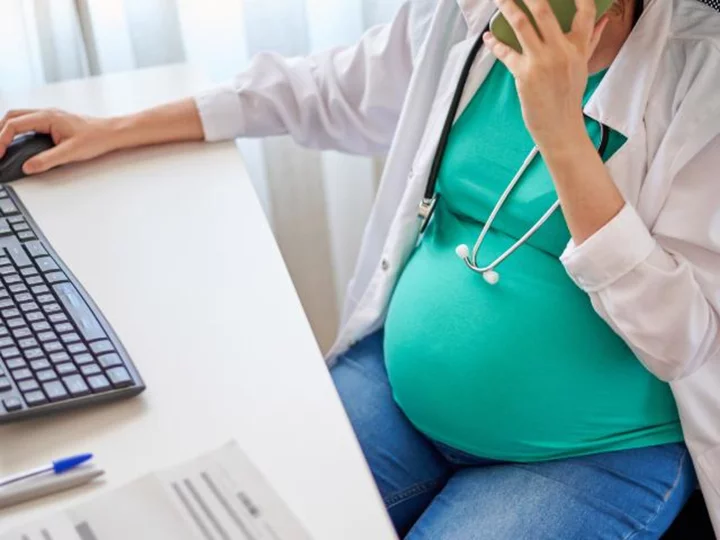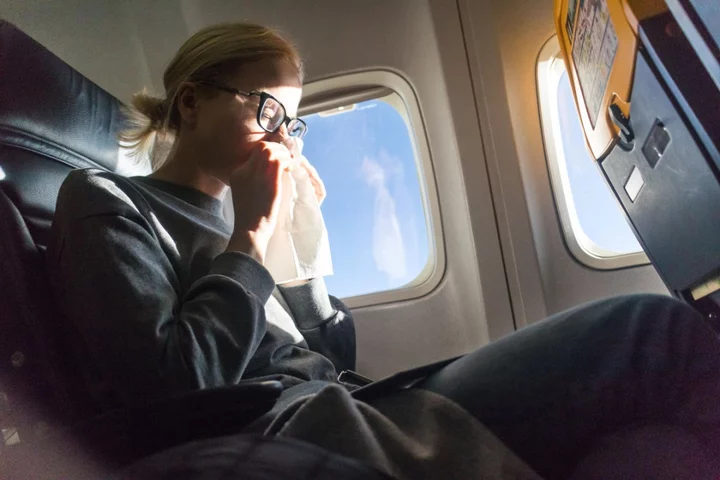
Sky Labs’ Paper on Cuffless Blood Pressure Measurement Technology Published in Scientific Reports
SEOUL, South Korea--(BUSINESS WIRE)--Jun 27, 2023--
2023-06-27 21:27

Results of a new Antibacterial Technology from DeBogy Molecular that reduces Bacteria and Deadly Infection in Medical Implants reported in the Journal of Orthopedic Research
FARMINGTON, Conn.--(BUSINESS WIRE)--Jun 27, 2023--
2023-06-27 20:51

Walgreens cuts profit forecast on lower COVID vaccine demand
(Reuters) -Walgreens Boots Alliance on Tuesday cut its profit forecast for the year on lower demand for COVID-19 tests and
2023-06-27 19:45

Bee Rx™ Natural Skincare Launches in Canada
TORONTO--(BUSINESS WIRE)--Jun 27, 2023--
2023-06-27 19:23

Nearly 1.5m 18 and under referred for mental health support in 2022 – charity
Almost 1.5 million people aged 18 and under were referred for mental health support in 2022, according to a youth mental health charity. According to YoungMinds’ analysis of data from NHS Digital, there were 1,425,193 referrals last year, a rise of 76% since 2019. The charity also said it is the second consecutive year that referrals have topped one million. Laura Bunt, chief executive of YoungMinds, said: “Every day without action is another day thousands of young people are without the mental health support they need. Behind every number is a young person facing impossible challenges.” In April 2022, the Government made a call for evidence for a new 10-year mental health plan. Any new plan for the NHS workforce needs to include significant measures to increase the numbers of mental health specialists we have working in children and young people's mental health services Tom Madders, YoungMinds As part of the call, 13,887 people under the age of 25 completed a YoungMinds survey and the answers were shared anonymously with the Government. Ms Blunt said those who responded made it “loud and clear what change was needed”. However, the plan was shelved in favour of the Major Conditions Strategy, which grouped mental illness together with the likes of cancer and chronic respiratory diseases. The call for evidence for the new strategy ends on Tuesday. In response, YoungMinds and a group of young people will take two vans to Westminster displaying messages from some of the people who responded to the initial call over the 10-year mental health plan. Ms Blunt added: “Twelve months on, as the situation worsens, we are still waiting. The Government had an opportunity to hear from young people and take action that could transform the system, but all we’ve seen is delay. “The Government must listen to young people and commit to action that drives down numbers of young people needing support, prioritises early intervention, and properly funds mental health services.” Tom Madders, director of communications and campaigns at YoungMinds, said: “This explosion in referral numbers has led to wait times being as long as two years in parts of the country. “One of the biggest barriers for getting wait times down is the lack of staff and young people are paying the price for a total absence of workforce planning over the past few years.” On Sunday, Prime Minister Rishi Sunak said the NHS Workforce Plan, a 15-year blueprint outlining how the NHS will retain and recruit staff, will be published this week. Mr Madders added: “Any new plan for the NHS workforce needs to include significant measures to increase the numbers of mental health specialists we have working in children and young people’s mental health services.” Read More Charity boss speaks out over ‘traumatic’ encounter with royal aide Ukraine war’s heaviest fight rages in east - follow live Holiday hygiene horrors: Summer health risks to avoid, from flying to hotels Pretty garden plants you didn’t know you could eat Group B Strep: 8 things every parent should know
2023-06-27 18:49

Fluke Advanced Wire Tracers Locate Wiring Problems Without Time-Consuming Guesswork
EVERETT, Wash.--(BUSINESS WIRE)--Jun 27, 2023--
2023-06-27 18:25

Pregnant workers and nursing moms have new protections on the job
Pregnant workers should have an easier time getting a stool, extra bathroom breaks or a bottle of water without fear of getting fired, thanks to a new law that takes effect on Tuesday.
2023-06-27 18:17

Earthbound solar storm could cause 'internet apocalypse'
Rumours of a global internet outage due to a severe solar storm have been swirling online, but how true are they? With plenty of us relying on internet access on a daily basis for our work, entertainment and communication needs, the rumour of an internet apocalypse has left many worried. Throughout June, the possibility that we could lose internet for months has been spreading. But, the very possibility first gained public attention back in 2021 when computer scientist Sangeetha Abdu Jyothi at the University of California Irvine warned that a catastrophic solar storm could occur within the next 10 years. Sign up to our free Indy100 weekly newsletter It seems the space agency NASA is taking the risk seriously and launched the Parker Solar Probe (PSP) which revealed clues about the sun’s atmosphere after successfully navigating through the powerful solar winds generated there. What is a solar storm and how could it cause an internet apocalypse? A solar storm refers to the atmospheric effects we experience on Earth that originate from the sun, typically caused by solar flares. During such storms, a stream of an electromagnetic field is directed towards Earth which causes the aurora borealis. NASA believes solar storms run on an 11-year cycle with their frequency varying. Their severity can also vary, with stronger geomagnetic storms causing interruptions to satellite, radio and internet functions. A 2011 geomagnetic storm interrupted radio signals in South China, meanwhile in 1859 a particularly intense storm caused auroras to appear in the skies all around the world. Should such an event strike today, there could be a worldwide blackout causing disruption for months, with its effects predicted to be 20 times that of a catastrophic hurricane due to its impact on the supply chain of essentials like foods and medication. Have your say in our news democracy. Click the upvote icon at the top of the page to help raise this article through the indy100 rankings.
2023-06-27 18:17

Holiday hygiene horrors: Summer health risks to avoid, from flying to hotels
Nobody likes getting sick, and illness on holiday is even worse – who wants to waste their precious vacation days lying in bed when they could be out having fun? Unfortunately, the chances of catching a bug can be high when you’re travelling. From airports and planes crammed with passengers to hotel rooms and restaurants with questionable cleanliness (even if it’s not visible to the naked eye), no wonder so many of us end up with the lurgy abroad. Here, health experts discuss the major health risks that occur on summer holidays and how to avoid them. Airports “Airports often become crowded and therefore they present multiple hygiene risks,” suggests Dr Donald Grant from The Independent Pharmacy. “Touching surfaces, using airport bathrooms and being in close proximity to others can cause bacteria to spread, so it’s important to be hygiene-alert.” Plus, having to hand your passport, boarding pass and luggage to different staff members increases the number of touchpoints throughout your journey. Dr Angela Rai, GP from the London General Practice recommends regularly washing your hands or applying hand sanitiser as you make your way through the airport. She says: “Washing your hands or using hand sanitiser helps reduce the risk of transmission of lots of different infections, including viral infections, coughs and colds and potentially gastrointestinal infections as well.” Flying “If someone is sitting next to you [on an airplane] and they have a cold, it may well be that you might catch one,” says Dr Preethi Daniel, deputy medical director at London Doctors Clinic. “There are hundreds of viruses that cause illness and the fact that you are mixing with people from all over the world means exposure to viruses and bugs your body may not be used to already.” It’s not only airborne bugs that you have to worry about, says Grant: “Again, it’s important to wash or sanitise your hands frequently during your flight, especially before eating or drinking, after using the bathroom, or if you’ve touched your armrest, tray table or TV screen.” As an extra precaution, you might also want to wipe down your down your table and armrests with an antibacterial wipe. Hotel rooms “While all hotel rooms should be thoroughly cleaned between each guest’s stay, you can never be fully sure that your room is bacteria-free,” says Grant. “To be on the safe side, take some disinfectant wipes and give the surfaces a good wipe down when you arrive — and don’t forget the TV remote, which may have been handled by hundreds of people without being cleaned.” Be extra careful with eating and drinking utensils in your room, he adds: “You should avoid using drinking glasses or mugs provided by the hotel without cleaning them thoroughly first.” Food and drink When eating and drinking at local spots abroad, Daniel’s advice is to “check for cleanliness even in established restaurants; paying particular attention to the state of tablecloths, cutlery, glasses and whether the tables are wiped down properly”. Look out for flies on food as well, she warns: “They are often loaded with pathogens as they do not discriminate between feeding on food or faeces. “E. coli, salmonella or shigella are some of the most common causes of gastrointestinal infections on holiday. “Hepatitis A and typhoid are other infections you can contract from contaminated food or water.” Never drink tap water unless you know it’s safe, and beware of tap water being used in food and drink prep. Rai says to be careful with ice as it might have been made with tap water and “things like salads and raw vegetables that have been washed in that water”. “Stick to peelable fruit,” Daniel adds. “Bananas, mangoes and the like are perfectly fine to eat. Avoid anything that has already been peeled, chopped and is waiting in handy takeaway sizes for you.” Swimwear and towels “Unpleasant odours and growth of bacteria are some of the risks of poor hygiene when it comes to swimwear and beach towels,” says Daniel. “They trap moisture”, which could leave you vulnerable to “getting infections such as bacterial vaginosis or thrush”. Grant says: “Be mindful that your towel is likely getting dirtier on holiday than it would be at home — especially if you’re taking it to the beach or the pool. You should change or wash your towel at least every other day.” And unless you’ve got a different swimsuit for every day of the holiday, you’ll need to give it a wash. “You’re meant to wash your swimwear after every time you wear it, because you have to treat it like your underwear,” says Rai. Haven’t got access to a washing machine on holiday? Rai says: “Just gently hand wash your swimwear every time you use it with warm soapy water then hang it up to dry.” Read More Charity boss speaks out over ‘traumatic’ encounter with royal aide Ukraine war’s heaviest fight rages in east - follow live Pretty garden plants you didn’t know you could eat Group B Strep: 8 things every parent should know Princess Diana’s ‘black sheep’ jumper predicted to sell at auction for up to £70,000
2023-06-27 16:49

Strictly’s Amy Dowden gives health update after getting new breast following mastectomy
Amy Dowden has said she showed her reconstructed breast to her former Strictly Come Dancing co-star Sara Davies, after undergoing a mastectomy to treat breast cancer. The professional dancer revealed that Davies was helping to adminiser an injection as she continues to recover from her operation, which took place two weeks ago. Dowden, 32, also spoke about her surgery in more detail via her Instagram Stories and said she had “no choice” but to undergo a full mastectomy because she had “more than one tumour”. In May, the TV star revealed she had been diagnosed with grade three breast cancer, which is the most aggressive grade, but doctors caught it early. She also suffers from Crohn’s disease and has been praised for raising awareness of the condition. She posted an Instagram Story with Davies on Monday (26 June) and explained that she had to give herself a new injection using a syringe rather than a pen, and Davies was there to help her. “I’ve not done it on my own before so guess who’s going to do it with me?” she said, before gesturing towards Davies, who smiled at the camera. “You don’t mind, do you? Also, what did I show you last night?” Davies replied: “I got to see the new boob. It’s a nice boob!” Amy laughed as she said that Davis suggested she should “get the other one done”. “I just said, that is one good-looking boob!” the former Dragon’s Den star clarified. “Marvellous job. Fantastic!” Dowden added: “Other than the nipple, you wouldn’t really know, would you?” In another video, the dancer explained that after her mastectomy, doctors were able to “put the implant in” her breast rather than an “expander” to help stretch the skin for a later surgery. “For me, it’s a better option because [it means] no more surgery. I woke up and they’d managed to put the implant in, so I have had reconstruction,” she told fans. “I believe later on you can have the nipple tattooed – not sure if I’m gonna do that yet.” Dowden’s post-surgery recovery comes as the Duchess of York is recuperating from her own mastectomy, after it was confirmed this week that she had been diagnosed with breast cancer. Sarah Ferguson’s spokesperson said on Sunday (25 June) that the duchess was “advised she needed to undergo surgery which has taken place successfully” and that she is “now recuperating with her family”. She spoke about her diagnosis in the latest episode of her podcast with businesswoman Sarah Thomson and urged everyone listening to “go and get checked… Don’t wait.” Dowden revealed her diagnosis in an interview with Hello! magazine and said she has “got a really good chance of getting back out on the dance floor as soon as possible”. She added that she hopes to raise awareness around breast cancer alongside her existing work on Crohn’s, which is a lifelong disease where parts of the digestive system become inflamed. In 2020, she released a BBC documentary about living with the disease titled Strictly Amy: Crohn’s and Me. After her surgery, Dowden said she was waiting to find out if she needs to have just radiotherapy or additional chemotherapy. She told The Mirror that Strictly was “leaving the door open” if she can return to the show. “If I only have radiotherapy, I’ll be back on Strictly this season,” she said. “Once radiotherapy is done there’ll be nothing to stop me, there’s no pressure but Strictly is leaving the door open. It’s having something to work towards.” Dowden is married to her long-term partner Benjamin Jones, who is also a professional dancer. The couple wed in 2022, after having to reschedule their wedding due to the Covid pandemic. Read More How dogs became my greatest adversary on the dating scene Influencers called out for visiting and promoting Shein’s factory in China Philosopher sparks outrage with essay about why people shouldn’t travel: ‘Very elitist’ Woman whose baby was diagnosed with rare disease warns of ‘terrifying’ symptoms Man enters beard competitions around the world – and so does his wife Group B Strep: 8 things every parent should know
2023-06-27 16:19

JD Sports says still on track despite North American slowdown
By Sarah Young LONDON (Reuters) -JD Sports Fashion said there had been some softening in trade in its North American
2023-06-27 16:18

Group B Strep: 8 things every parent should know
Group B streptococcus (GBS) is the most common cause of life-threatening infection in newborn babies, and it can kill within hours – yet the UK doesn’t routinely test pregnant women for it. The charity Group B Strep Support (GBSS) says an average of two babies develop a GBS infection every day in the UK, and while most recover, one baby dies as a result of the infection each week, and one baby a week survives with life-changing disabilities. GBSS says around two to four out of every 10 women in the UK will carry group B strep in their rectum, vagina, or intestines, although most of them won’t experience any symptoms. However, if a woman’s pregnant, group B Strep can affect her baby around the time of birth. Speaking to mark July’s Group B Strep Awareness Month, GBSS chief executive Jane Plumb, who set up the charity in 1996 with her husband Robert after their son, Theo, died from GBS infection aged 17 hours, stresses that raising awareness of Group B Strep can save babies’ lives and minimise the heartache the illness often causes. “Group B strep is the most common cause of severe infection, including sepsis and meningitis, in newborn babies, yet people are not routinely told about it during pregnancy. This isn’t good enough,” she says. Here’s what all parents-to-be and new parents should know about GBS… 1. It can cause meningitis, sepsis and pneumonia As the most common cause of infection in newborns, Plumb says GBS, which affects around 800 babies in the UK every year, can lead to serious conditions including meningitis, sepsis and pneumonia. As a result, around 50 babies will die every year, and 75 will survive with a long-term disability. “Group B strep awareness is a matter of life and death,” says Plumb. “By shining a spotlight on this silent infection, we can save precious lives and spare families from unnecessary heartache.” 2. GBS infections can be prevented in babies Most GBS infections in newborn babies can be prevented, says Plumb, by identifying women with risk factors. “One of the risk factors is carrying the bacteria during pregnancy,” she says, “and then intravenous antibiotics can be offered during labour to minimise the risk of the baby developing a group B strep infection.” 3. A mother carrying GBS doesn’t necessarily mean her baby will be infected GBSS says around 20-25% of women carry GBS in their vagina and/or lower intestines, but if a woman is carrying GBS when she gives birth, the risk of her baby developing early-onset GBS infection is about one in 400 if antibiotics aren’t given in labour, or around one in 4,000 if antibiotics are given. 4. It’s not just newborn babies that get GBS infections Although most GBS infections develop in the first two days of life, they can develop later, though they are rare after the age of three months, says Plumb. “Knowing the key signs is vital – every family needs to know about GBS,” she stresses. 5. Most women who carry GBS don’t have symptoms GBS carriage isn’t associated with symptoms, says Plumb, so most people who carry the bacteria won’t show any signs of it. 6. Antibiotics may be given to some women during labour The Royal College of Obstetricians & Gynaecologists recommends that if GBS is detected in a woman during pregnancy, or if she’s previously had a baby affected by GBS, she should be offered antibiotics in labour to reduce the risk of the baby being infected. 7. There’s no routine GBS testing in the UK The NHS doesn’t currently provide routine testing for GBS, although other high-income countries do. Plumb says UK National Screening, which sets screening policy in the UK, says there isn’t enough evidence to introduce antenatal GBS screening for all pregnant women in the UK, although a randomised control trial is due to report in 2025, and the evidence is then expected to be reviewed. Plumb says: “The evidence shows clearly that antenatal testing is better than a risk-factor strategy for preventing GBS infection in newborn babies, and GBSS think the UK should catch up its peers around the world by introducing this. Most high-income countries do so, including the USA, Canada, Hong Kong and most of Europe – why are we last on the list?” 8. Pregnant women can be tested privately GBSS says pregnant women can be tested privately for GBS, usually at between 35-37 weeks of pregnancy, at some clinics, or by doing a DIY test with a kit, which costs about £40. GBSS helpline 0330 120 0796. Read More Charity boss speaks out over ‘traumatic’ encounter with royal aide Ukraine war’s heaviest fight rages in east - follow live Princess Diana’s ‘black sheep’ jumper predicted to sell at auction for up to £70,000 The best onstage fashion at Glastonbury Sarah, Duchess of York has operation for breast cancer: What to know about mammograms
2023-06-27 15:27
